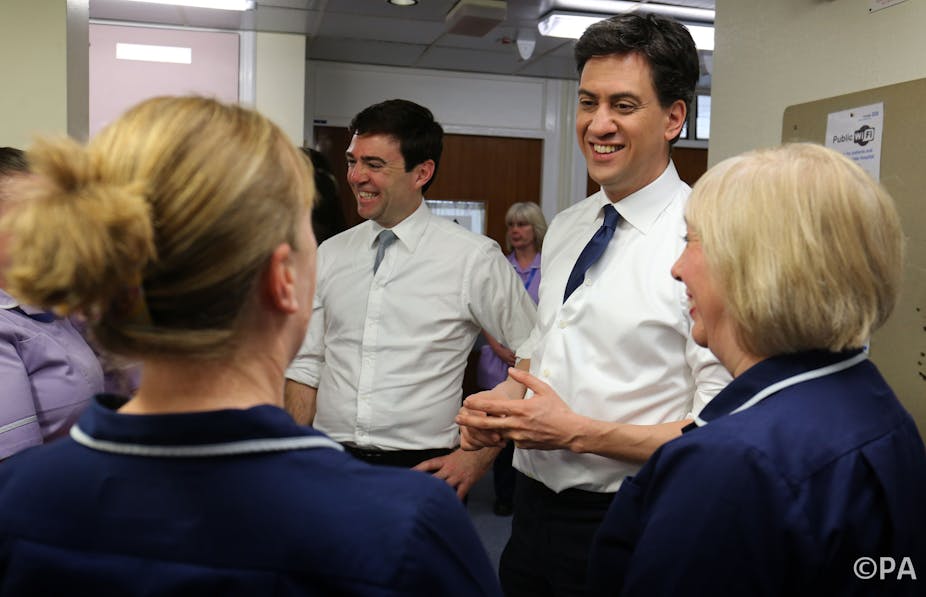The Labour manifesto refers to the NHS as “one of our great national institutions”, and has the stated aim to “rescue our NHS”, referring to the “wrong values” that the Conservatives have put at the heart of the NHS.
It is not surprising therefore that the manifesto should cover issues where the values of the parties most obviously diverge, such as the appropriate role of the private sector in the NHS. However, with that exception, it is quite difficult to find very much else in the proposals that could be argued about by any other party. This reflects the difficulty in tackling the seemingly intractable problems that the NHS is experiencing.
More money
No party will go into the election suggesting that the NHS should receive less government funding given the increasing demands on the NHS and the size of the projected funding gap. The challenge is how much extra is “enough” and on what will it be spent. The Labour strategy targets investment towards increasing staff numbers in order to allow more “time to care” – in particular nurses, GPs, midwives and home-care workers. The NHS employs 1.2 million full-time equivalent staff and although overall staff numbers have increased in most years over the past decade, the biggest growth has been in consultants. Meanwhile GPs and nurses have seen more modest growth.
Given that recent concerns have focused on the safety implications of staffing levels, particularly in relation to hospital nurses; and as the extra demand faced by accident and emergency departments has at least, in part, been blamed on lack of access to GPs, these plans may help improve access and quality. However, the devil will be in the detail if these investments are to pay off in the longer term.
Joined-up care
Again, no party will suggest that fragmentation of services is the key to a good healthcare experience for citizens nor to providing an efficient service; hence the focus on co-ordination and integration of services across the health and social care sectors is not surprising.
This reflects current policy direction with a plethora of integrated schemes introduced in the past few years. Labour plans include the pooling of funds (at local level) in order to facilitate integrated care – again, already reflected in current policy such as the Better Care Fund and personalised budgets. Judging the success of integration is not straightforward and evidence is mixed especially in terms of the potential financial impact.
Prevention is better than cure
No-one will argue against the manifesto emphasis on prevention and public health as a means to make the NHS more sustainable in the face of increasing demand. Plans to tackle obesity include setting maximum permitted levels of sugar, salt and fat in food marketed to children.
This contrasts with the “fat tax” or “sugar tax” that has been adopted by some countries, although evidence varies as to whether that approach is effective. A “levy on tobacco firms” is mentioned as one means of finding the extra funds for the NHS, which would be an interesting development, but no detail is provided.
Public not private
The manifesto states it will repeal the Health and Social Care Act which is viewed by some as a major route into “privatisation” of the NHS. Labour also says it will ensure the Transatlantic Trade and Investment Partnership Treaty will not adversely affect the NHS by allowing it to be subject to free trade. On the other hand, the party is not ruling out some involvement of the private sector as it will seek to make NHS providers the “preferred providers” of services and will cap the profits that can be made by private companies providing clinical services.
Many of the policies are as expected – reducing the role of private finance and private companies in favour of the NHS, focusing on prevention and lifestyle issues, viewing integrated care as the future for organisation of services, investing in more front-line staff. There are however, a few things mentioned that are a little more surprising. For instance, creating a Cancer Treatments Fund for patients to have access to the latest drugs and treatments seems to be reinventing the heavily criticised Cancer Drugs Fund.
Around patient safety and quality, the Labour proposals suffer from being too vague. However, some could have significant implications depending on how they are implemented. For instance, making every hospital death the subject of an “appropriate level of review”, seems fine in principle but could imply substantial bureaucracy in practice. Another example is modernising the regulation of healthcare professions, which omits to mention the important issue of which professions the party is actually talking about. Past experience suggests that for some parts of the profession, this could take a lot longer to negotiate than even several Labour governments could manage.

